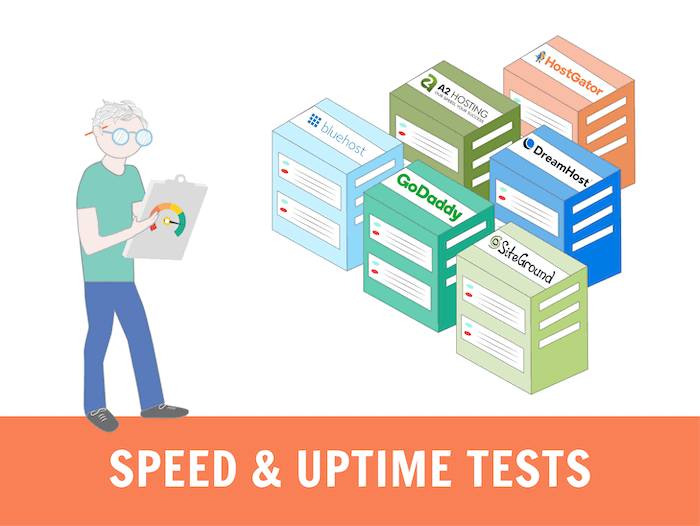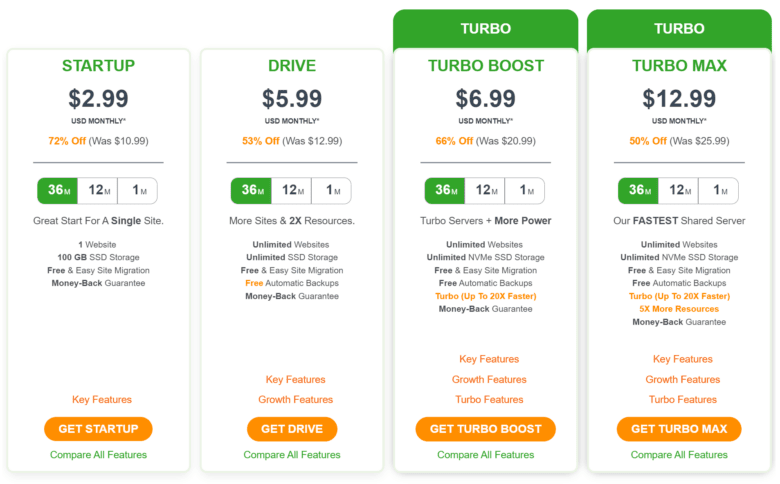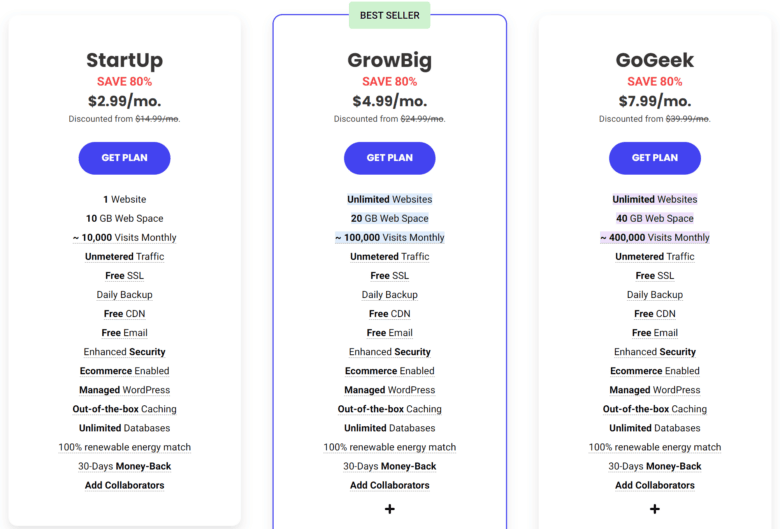Tooltester is supported by readers like yourself. We may earn an affiliate commission when you purchase through our links, which enables us to offer our research for free.
Speed and reliability are two things that go hand in hand when we’re talking about web hosting.
A good web host has got to be fast, and it’s got to be reliable.
Why is that?
Well, if your web pages don’t load quickly, or your website is unavailable when people try to visit it, then those people won’t hang around to find out why!
Indeed, Google calculated that 53% of mobile users leave a page if it takes more than 3 seconds to load.

A slow, unreliable website will not please your visitors!
And research by Gartner suggests that website downtime (when a website is not accessible), costs US companies an average of $5,600 per minute!
So speed and reliability are vital for user experience and conversions. But they’re also really important for your search engine rankings. Google has included web page speed as a ranking factor since 2010.
And one study found that if a website suffers six hours of downtime, its search rankings will decrease 30% on average, and can take up to 2 months to recover when the website comes back online!
All this, (and many other statistics), show that a fast and reliable web host is vital for your business success.
But how do you find one?
Luckily for you, we have been testing the speed and reliability of the most reasonably priced web hosts since 2019. So we can tell you categorically which are the fastest and most reliable web hosting companies available today.
But before we reveal the winners for 2022, it’s important to understand both the terminology and the testing methodology we use (because it’s not as simple as entering a URL and counting Mississippis!).
So, we measure the reliability and speed of a web host using uptime and page load time.
What is Website Uptime (and how does it relate to web host reliability)?
Uptime is a metric that is used to measure website availability. If a website is available and accessible to web users, it is “up” and the percentage of time that it is up is called “uptime”.
Conversely, if a website is unavailable and inaccessible to web users, it is deemed “down”, and the percentage of time that it is down is called “downtime”.
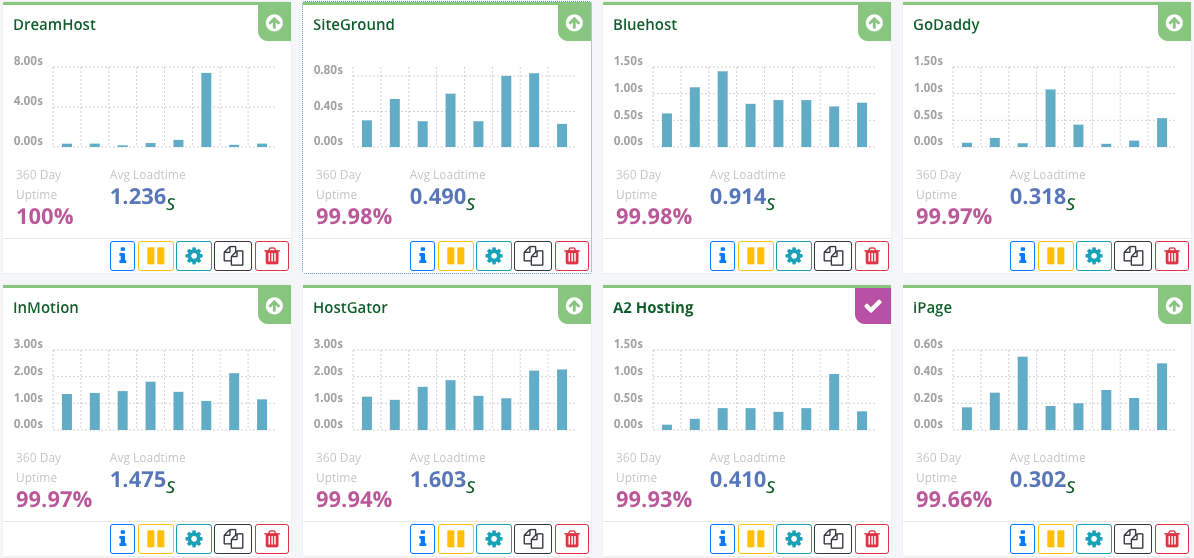
Testing web host’s uptime
Downtime means seconds, minutes, or worse, entire hours when users can’t access your website. This could be due to glitches, maintenance and fixes, or spikes in traffic that choke your bandwidth.
Lots of uptime is obviously good and an indication of a reliable web host. While lots of downtime is clearly bad and an indication of an unreliable web host!
What is a Reliable Level of Uptime?
One of the things that confuses many people about uptime is the scale of the differences between what is considered a good level of reliability and a bad level of reliability.
For example, 99.99% uptime indicates a good level of reliability. But we only need to drop down 0.04% to 99.95% for the uptime to only just be considered adequate!
And when we get to 99.8% and less of uptime, we’re already getting into the realms of poor levels of reliability!
This is because these tiny differences in percentage will equate to significant periods of time that a website is inaccessible when measured across a year.
So, a website that has 99.99% uptime, will suffer less than an hour of downtime over a year.
But a website that has 99.8% uptime will be down and unavailable to users for over 17 hours over a year, which can equate to a huge amount of lost business!
You can use this uptime calculator to see how different uptimes translate to real word time periods!
But remember: small differences in uptime can mean huge differences in the levels of web host reliability.
Website Hosting and Uptime Guarantees
Many website hosts offer uptime guarantees, where they commit to providing a certain percentage of uptime every month (usually 99.9% or more). It’s usually called Service Level Agreement (SLA).
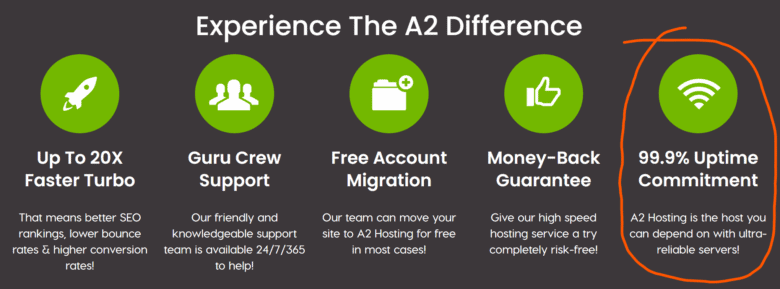
A2 Hosting offers a 99.9% Uptime Guarantee
If they don’t meet that commitment, then they will give you a small refund. However, it’s down to you to tell them it’s not been met, and they will determine whether they agree through their own metrics.
While I’m very dubious about how often these guarantees result in payments when their commitments have not been met, we once did get a refund from WP Engine once when they didn’t meet their SLA.
What is Page Load Time (and how does it relate to web host speed)?
Page load time is obviously a measure of how long a webpage takes to load into a browser, in seconds.
But that length of time will partly depend on the size of all the files that make up that page (and how they are organized), not just on how quickly a web host sends them.

File size also makes a big difference to page load time
That’s why the only way to accurately compare the speed of two web hosts is to put exactly the same website on each account (more on this below).
Once the variability in page size is removed, the responsibility for page load time does largely lie with the web hosts servers. More server resources will allow the data to move faster.
But there’s still a lot of other variability here, relating to where visitors are coming from, at what time of the day, and from what device. Close proximity to the web servers, comparatively quiet periods and desktop devices all favor faster speeds.
What is a Fast Page Load Time?
Google recommends that a web page should load in less than 2 seconds. And I would say anything longer than 3 seconds is getting into the slow territory.
However, page speed is not as easy to measure as you might think, and simply looking at the average page load time in Google Analytics might show some scarily high and not entirely useful numbers.
This is another reason to use carefully considered scientific methods to compare the speeds of different web host providers. Which brings us nicely to:
How we ran our web host speed and reliability tests
First, I opened new accounts with all the hosting providers that we habitually review:
- A2 Hosting
- Bluehost
- DreamHost
- GoDaddy
- HostGator
- InMotion
- iPage
- Hostinger
- GreenGeeks
- Kinsta
- Cloudways
- WP Engine
- IONOS
- Namecheap
- SiteGround
Then I created identical WordPress websites (containing a mix of text, images, videos and tables), on each account.
I didn’t add any page speed optimization plugins myself, but if the accounts came preloaded with such plugins, I left them activated.
This would obviously give those providers an advantage in terms of speed. But the logic here is that we are measuring the speed of the default setups.
Page Load Time Tests
Running one speed test isn’t enough. So I put in the work and ran 5 rounds of tests with 4 different tools over a 6-week period. These are the tools I used:
I ran the tests from different locations around the world, (including Vancouver, São Paulo, San Francisco, Tokyo and New York), at different times and on different days of the week.
This year, for the first time, I also used the Page Speed Monitoring tool in StatusCake which tests the page load times of each website, every 15 mins, seven days a week.
Uptime Tests
I have also been using StatusCake to monitor the uptime of the websites over the last 12 months.
Finally, I collated all the results to find the averages for each of the 15 providers.
If you want to pore over the data yourself, here’s the Google Sheet where I logged all the info. For the conclusions, just read on below.
Which is the Fastest Web Host?
This year, GreenGeeks was the fastest web host we tested, with an average page load time of 1.29 seconds. The runners-up were A2 Hosting on 1.3 seconds and GoDaddy on 1.44 seconds.
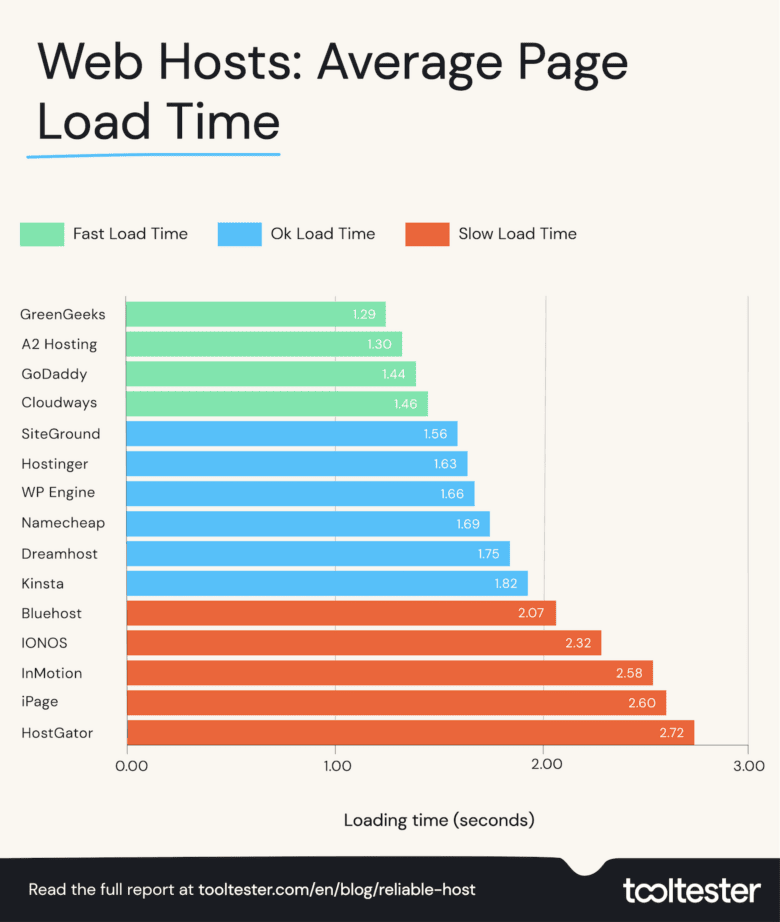
Last year’s winners, SiteGround, came in fourth place on 1.56 seconds, a good way behind Cloudways on 1.46 seconds.
The slowest web host we tested this year was HostGator, with an average page load time of 2.72 seconds. This poor performance is typical of HostGator; last year they were the second slowest, just in front of BlueHost.
How web host speed has changed over the last 3 years of our tests
| 2020 | 2021 | 2022 | |
|---|---|---|---|
| Page Load Time in Seconds | |||
| GreenGeeks | 2.39 | 1.56 | 1.29 |
| A2 Hosting | 3.15 | 2.01 | 1.30 |
| GoDaddy | 3.40 | 1.94 | 1.44 |
| Cloudways | 2.32 | 1.73 | 1.46 |
| SiteGround | 2.14 | 1.54 | 1.56 |
| Hostinger | 4.19 | 1.61 | 1.63 |
| WP Engine | 2.21 | 1.65 | 1.66 |
| Namecheap | – | 1.60 | 1.69 |
| Dreamhost | 3.28 | 1.84 | 1.75 |
| Kinsta | 2.98 | 1.77 | 1.82 |
| Bluehost | 3.07 | 2.87 | 2.07 |
| IONOS | – | 1.95 | 2.32 |
| InMotion | 4.36 | 2.75 | 2.58 |
| iPage | 4.19 | 2.76 | 2.60 |
| HostGator | 3.77 | 2.78 | 2.72 |
Which is the Most Reliable Web Host?
There were 5 web hosts in our tests with perfectly reliable, 100% uptime:
- SiteGround
- WP Engine
- Namecheap
- Kinsta
- InMotion
A2 Hosting and Cloudways also did very well in providing 99.99% uptime, with HostGator not far behind on 99.98%. Most of the other web hosts only had adequate uptime scores.
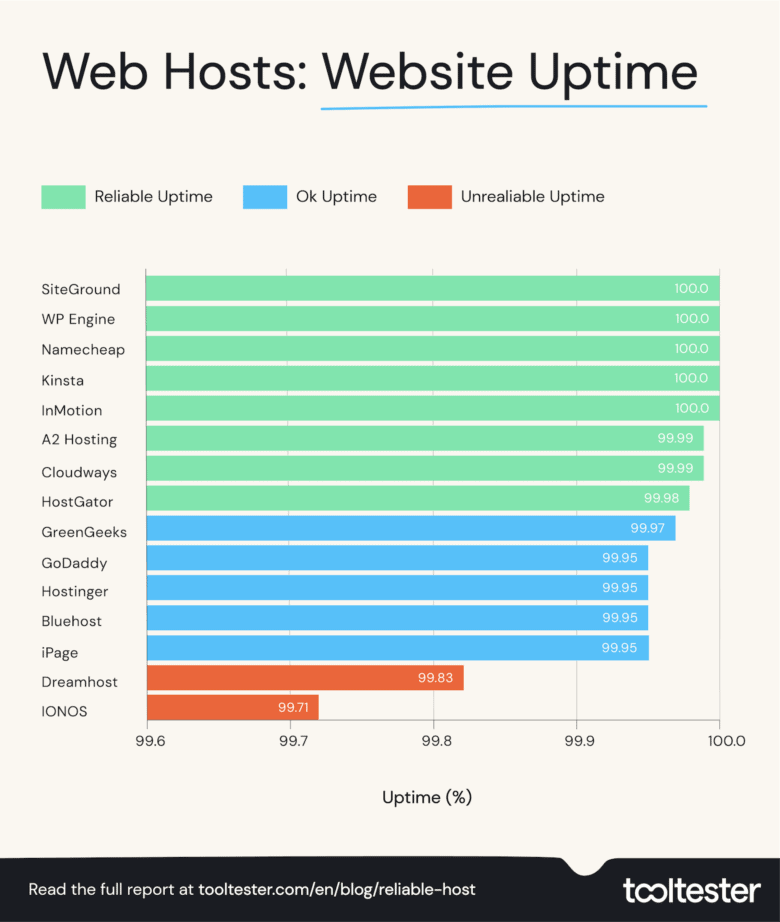
IONOS were the least reliable web host, with a very poor 99.71% uptime. Dreamhost weren’t that much better on 99.83%.
How web host uptime has changed over the last 3 years of our tests
| 2020 | 2021 | 2022 | |
|---|---|---|---|
| Uptime % | |||
| SiteGround | 99.97 | 100 | 100 |
| WP Engine | 99.99 | 99.99 | 100 |
| Namecheap | – | 100 | 100 |
| Kinsta | 100 | 100 | 100 |
| InMotion | 99.73 | 99.95 | 100 |
| A2 Hosting | 99.99 | 99.98 | 99.99 |
| Cloudways | 100 | 100 | 99.99 |
| HostGator | 99.91 | 99.99 | 99.98 |
| GreenGeeks | 99.98 | 99.98 | 99.97 |
| GoDaddy | 99.90 | 99.96 | 99.95 |
| Hostinger | 99.48 | 99.92 | 99.95 |
| Bluehost | 99.96 | 99.99 | 99.95 |
| iPage | 98.45 | 99.85 | 99.95 |
| Dreamhost | 99.99 | 99.96 | 99.83 |
| IONOS | – | 99.93 | 99.71 |
Price Considerations
You get what you pay for, right? That’s what everyone says, anyway. And I would certainly expect to get faster speed and better reliability when I pay more for my web hosting.
Web Host Speed vs Price
However, when I looked at the relationship between page load time and the renewal price of the different web hosts, it wasn’t as simple as that, as you can see in the graph below.
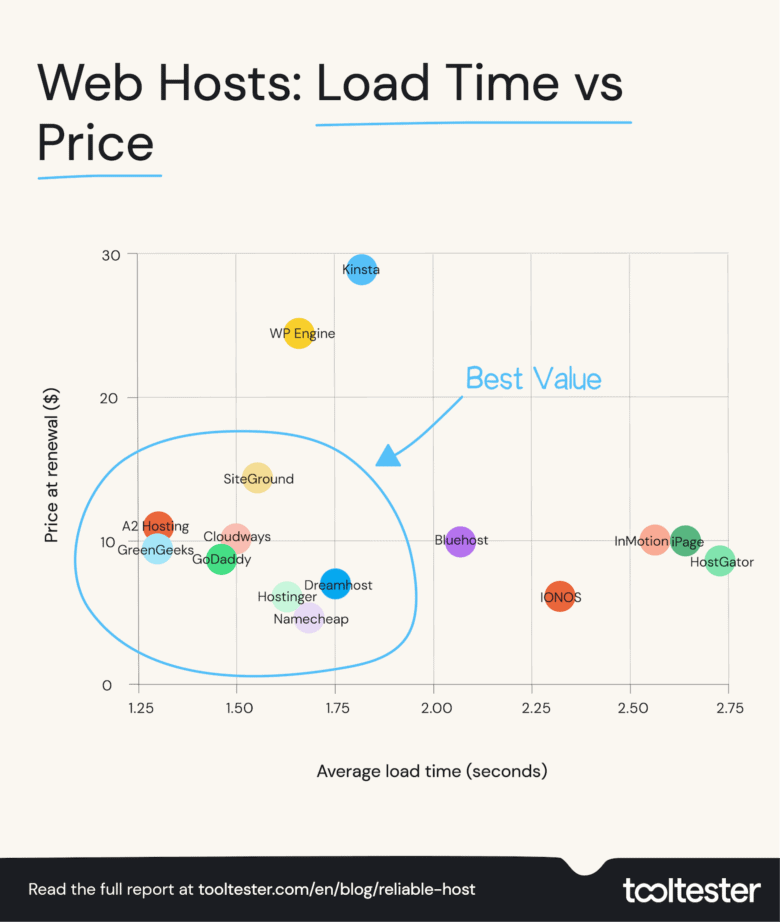
Note: when you’re trying to decide between different web hosts, you should always look at the renewal price, which is what you’ll pay once the initial introductory price comes to an end.
This is because the introductory price is usually unrealistically low, and therefore limited in time, and if you stick with a host, it’s the renewal price that you’ll pay from then on.
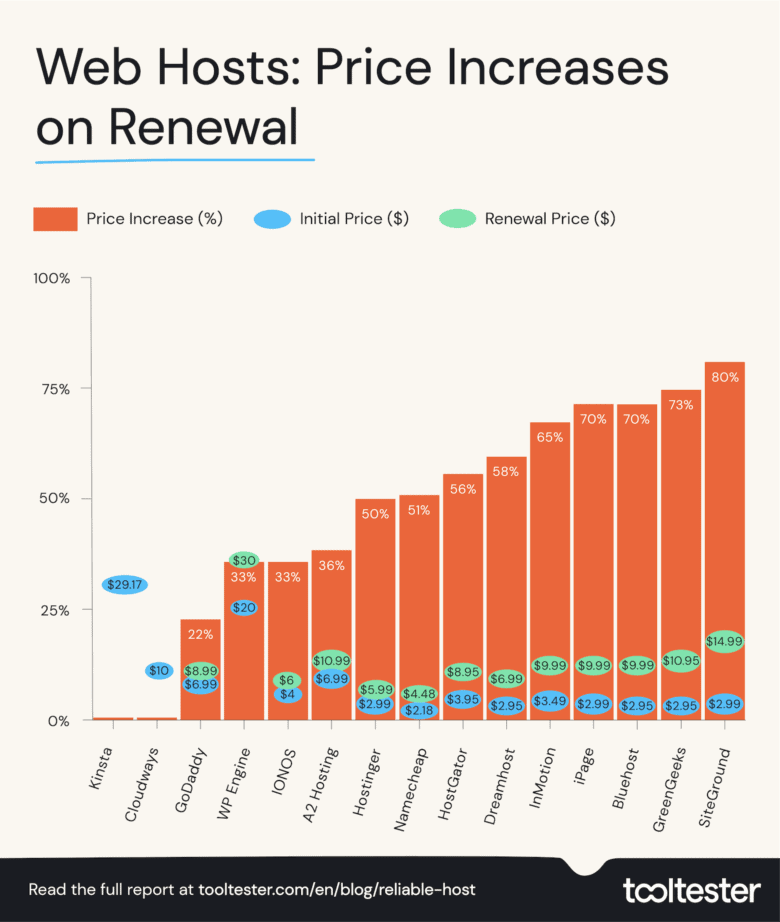
But as you can see in the graph, Kinsta and WP Engine are the most expensive web hosts, but they certainly weren’t the fastest. There’s a whole load of web hosts that provide similar or faster speeds, that are also significantly faster!
Web Host Uptime vs Price
If we look at uptime, there is a closer relationship between price and reliability. The three most expensive web hosts (Kinsta, WP Engine and SiteGround) all have 100% uptime.
However, joining them on 100% uptime was Namecheap, which are actually the cheapest web host (on renewal price) in our tests. So, low price doesn’t always mean poor reliability.
Of course, speed and reliability aren’t the only factors you should be taking into consideration when you choose a web hosting provider. And that means that they’re not the only thing affecting the price you’ll pay.
Let’s have a quick look at some of the other factors to consider when picking a web host.
Other Considerations (besides Page Load Time and Uptime)
Customer Service
I would argue that the level of customer service you receive is actually another vital measure of a web host’s reliability. To be genuinely reliable, a web host needs to be available and able to solve your problems quickly, when they arise.
And have no doubt: with every web host, you will experience problems which will need resolving through interactions with their customer support team!
Luckily, we have also tested the customer support of each web host, and you can see the results in the table below.
| Provider | Live Chat | Email & Ticket | Phone Support | Support Score |
|---|---|---|---|---|
| Kinsta | 24/7 | 24/7 | 24/7 | |
| A2 Hosting | 24/7 | 24/7 | 24/7 | |
| WP Engine | 24/7 | 24/7 | 24/7 | |
| InMotion | 24/7 | 24/7 | 24/7 |
|
| SiteGround | 24/7 | 24/7 | 24/7 |
|
| GreenGeeks | 24/7 | 24/7 | 9am – 12am EST |
|
| NameCheap | 24/7 | 24/7 | No |
|
| DreamHost | 3am – 9:30pm PT | 24/7 | No |
|
| Bluehost | 24/7 | 24/7 | 24/7 |
|
| GoDaddy | 24/7 | 24/7 | 24/7 |
|
| Hostinger | No | 24/7 | No |
|
| CloudWays | 24/7 (15 min limit) |
24/7 | No |
|
| IONOS | 24/7 | 24/7 | 24/7 |
|
| HostGator | 24/7 | 24/7 | 24/7 |
|
| iPage | 24/7 | 24/7 | 24/7 |
|
In this case, there is a strong correlation between price and customer service: the more you pay, the faster and more efficiently your problems will be solved.
Kinsta, WP Engine and SiteGround, are the three most expensive web hosts and in my tests they also had fantastic support. The answers came fast, and they made complete sense.
Mid-priced A2 Hosting and GreenGeeks also did a fine job, even if they sometimes took a little longer to get back to me.
Conversely, with the cheaper web hosts, there were often restrictions on how or at what times I could contact customer support, I had to wait longer to be connected, and once in contact, it sometimes took a little longer to resolve the issues.
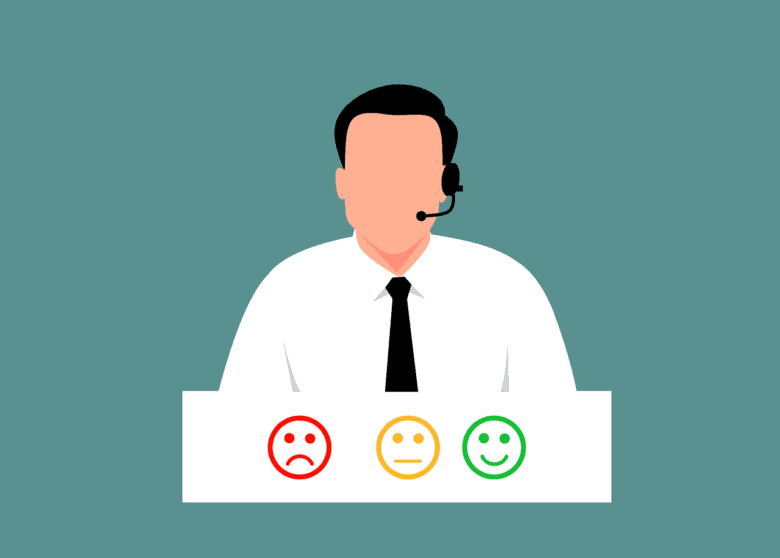
Customer support varies a lot!
I was quite frustrated by GoDaddy, HostGator, Bluehost and iPage’s support teams in particular. They often left some of my questions unanswered or took way too long to get back to me.
However, there were also exceptions! Both DreamHost and InMotion are relatively cheap, but I found their customer support very quick, reliable and super helpful.
Web Hosting Features
There are plenty of other things to consider when choosing a web host that have are more to do with the features they provide than anything to do with speed or reliability. They include:
- Ease of use
- Domain name availability
- WordPress or other CMS features
- Email services
- Database provision
- Storage limitations
- Monthly data transfer limits
- Security features
- Website backup features
- Refunds and guarantees
Depending on your specific needs, some of these may be just as important as speed and reliability.
So make sure you check out our guides to the best cheap web host, the best cheap WordPress hosting, best overall web host and our hosting comparison tool, where we take all these factors into consideration.
Note: it’s important to remember that while there are certain other steps you can take to fix a slow website or even make WordPress faster, you won’t get very far if your web host is slow!
Fastest and Most Reliable Web Hosts: Key Takeaways
So which are the fastest and most reliable web hosts overall, and which one should you pick?
Well, let’s start with one important distinction between uptime and page speed. Uptime is solely the responsibility of the web host, so there is nothing you do to improve it, if it’s poor.
Whereas, since website page speed is influenced by lots of different factors, there are many things you can do to try to mitigate poor web host performance.
Does that mean we should prioritize reliability over speed? No, definitely not. Although there are many optimizations you can make to improve page speed yourself, none of them will make much difference if you have a really slow web host!
It simply means that we should eliminate the web hosts with poor uptime first, as it’s a non-negotiable.
So, due to their poor uptime, I would avoid IONOS and DreamHost for sure.
GoDaddy, Hostinger, Bluehost and iPage had just acceptable levels of uptime. But I would probably avoid iPage because the customer support was poor.
If we look at these providers in terms of speed as well, Bluehost seems quite slow and expensive compared to the others, so I would swerve it too.
GoDaddy and Hostinger might be OK, as despite the mediocre uptime they are reasonably fast (especially GoDaddy) and the renewal prices are very competitive (especially Hostinger).
Namecheap: The best budget option
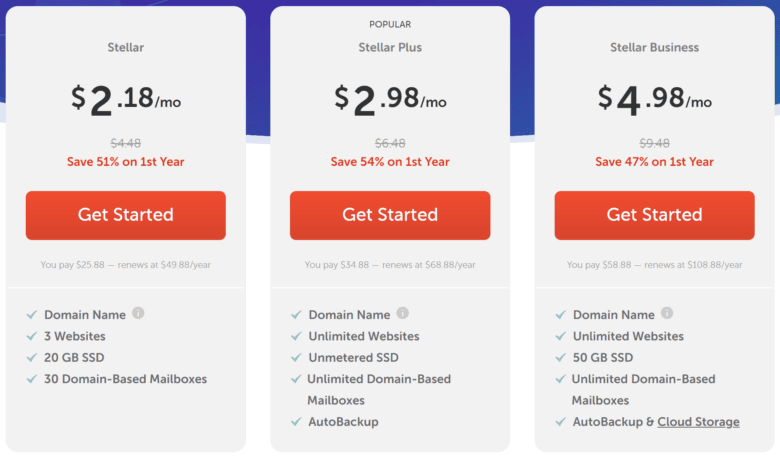
Namecheap: the best budget option
However, if you’re looking for a cheap web host, Namecheap is probably a better option. It had 100% uptime in our tests, reasonable speed, and the cheapest renewal price of all the hosting providers.
A2 Hosting: A good, mid-priced option
The fastest web hosts were GreenGeeks and A2 Hosting, both of whom also had good uptime. Either of these web hosting providers would be a great, mid-priced choice, with A2 Hosting perhaps shading it due to more features and better customer support (see the individual reviews or the round up).
A2 Hosting: a good, mid-priced option
At the more expensive end, I think the high prices of WP Engine and Kinsta don’t really justify what you get. Although both had 100% uptime, neither were particularly fast in our tests.
Siteground: A more premium choice
So, if you’re looking for a premium web host, then Siteground wins again for me. It’s significantly cheaper than Kinsta and WP Engine, but beats them both for speed. It also had 100% uptime in our tests, great customer support and their hosting is packed full of useful features.
Siteground: a more premium choice
Don’t forget: it’s not all about speed and reliability! You should also place close attention to the feature set you get with each web host, as there’s a huge amount of variability.
With that in mind, please make sure to check out guides to the best cheap web hosts, the best cheap WordPress hosts and our handy web hosting comparison tool.
And please let us know about your experiences with these web hosts in the comments below…
We keep our content up to date
19 Oct 2022 – New tests and additional information
23 Aug 2021 – New tests and general update
16 Feb 2021 – Information about the test setup
01 Oct 2020 – Second performance tests. Kinsta, Hostinger, WP Engine and Cloudways added
04 Jul 2019 – First performance tests
THE BEHIND THE SCENES OF THIS BLOG
This article has been written and researched following a precise methodology.
Our methodology